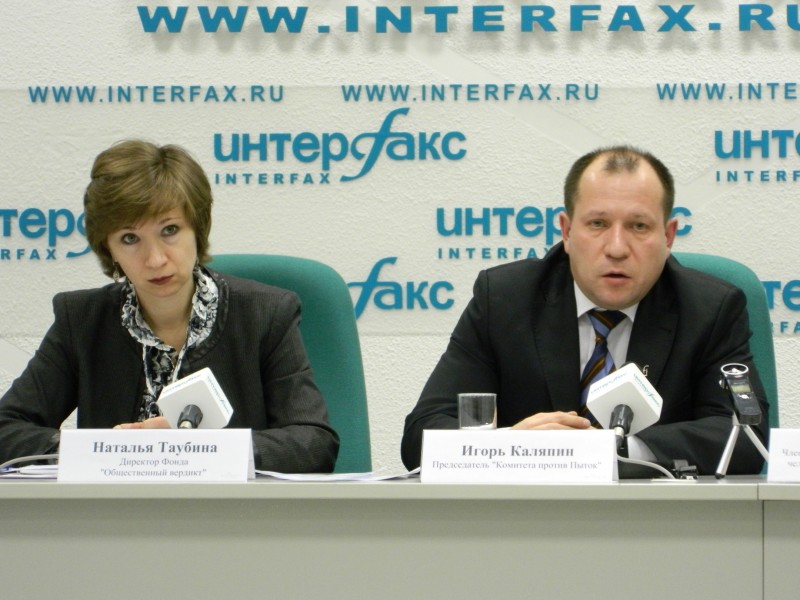On March 22 in Moscow in Interfax headquarters there was a press-conference entitled “How can we put an end to tortures in Russia?”. Among the participants there were Natalia Taubina, Public Verdict Foundation Director, Valentin Gefter, Human Rights Institute Director, member of the Presidential Human Rights Council, Sergey Nikitin, Director of the Russian office of Amnesty International, and Igor Kalyapin, Chairman of INGO “Committee Against Torture”.

During the press-conference human rights defenders proposed to create a special department under the Russian Investigative Committee to deal with allegations against the police. “We find it necessary and possible to suggest or even demand right now that the Investigative Committee creates a separate special structure … a group of investigators, to put it simple, who would investigate into the allegations of police abuse in every Russian region “, said Igor Kalyapin to journalists.
According to human rights defenders, such step would allow to break the interdependence between investigators and law enforcers. “Investigators of this special-purpose group would consider complaints about a police officer without thinking of how they would have to disclose a rape, murder or abduction with this cooperate with this policeman or his colleague”, explained Kalyapin.
According to Public Verdict Foundation Director Natalia Taubina, the human rights defenders’ proposal has already been submitted to the Investigative Committee. In the future to improve performance of law enforcement agencies human rights defenders recommend to create a separate body that would deal with allegations only against policemen.
The full text of the open address is given below.
To Russian Investigative Committee Chairman
A.I. Bastrykin
DearMr. Bastrykin,
A tragic incident recently took place in Kazan – Sergey Nazarov died as a result of tortures in the Dalny Department of Internal Affairs. In course of investigation into the circumstances of the tragedy other facts of unlawful use of violence by Kazan policemen came to light. Abuses disclosed by human rights NGOs and mass media on a regular basis witness that law enforcers resort to tortures not only in Tatarstan, but throughout the country. Quite recently we were shocked by the death of underage student Nikita Leontyev beaten to death by the police in Saint-Petersburg.
We cannot tolerate this situation any longer. Urgent measures are required to combat police abuse, including actions of the Investigative Committee.
Tortures still exist because they generally remain unpunished. Officers using tortures continue working in law enforcement authorities, because crime reports are not investigated properly.
Independence of investigators is a compulsory criterion of adequate and thorough investigation of such crime reports. At present the Investigative Committee operates in a way that independence cannot be ensured when police abuse allegations are considered. Torture complaints are checked by the same investigators who work with general crimes falling under the jurisdiction of the Investigative Committee. General crimes are investigated in close cooperation with policemen who provide the so called “operative support” for the investigation.
Therefore, an investigator initiating inquiry into the fact of tortures used by a policeman jeopardizes smooth cooperation with the police required for investigation of other crimes. The incident in Kazan has clearly demonstrated the consequences of this conflict of interests. Before Sergey Nazarov’s death Kazan residents many times complained about police abuse in the Dalny Department of Internal Affairs, however, criminal proceedings were not promptly instigated. This situation is typical and can be exemplified by hundreds of criminal proceedings from human rights defenders’ practice.
In our opinion, it is high time to eliminate the given conflict of interests and ensure de facto independence of investigations into crimes committed by law enforcement agents. It is necessary to separate work with general crimes from work with police abuse cases. It can be done by means of creating special departments charged with checking and investigating allegations against Interior Ministry, Federal Drug Control Service and Federal Penitentiary Service agents in the framework of the Investigative Committee. These departments can be directly subordinate to Investigative Committee heads or to heads of its regional offices – Investigative Administrations.
We urge you to immediately prepare and adopt required regulations to create special departments which would ensure independence of investigations into offenses committed by law enforcers.
Open address of human rights organizations Committee Against Torture, Agora (recognized as an undesirable organization), Public Verdict, Memorial, Civil Assistance Committee, Moscow Helsinki Group, Movement “For Human Rights”, Youth Human Rights Movement, Groza.
Sources: Public Verdict, Rapsi